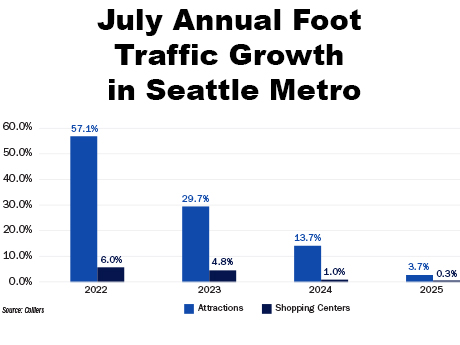— By Jacob Pavlik of Colliers —
As big-box retailers scale back or exit the market, a new class of tenants is reshaping the retail landscape across the Puget Sound region. Experiential retail is taking their space and providing destinations for consumers and the experiences they crave. This umbrella term includes concepts that prioritize interaction, entertainment and social connection. This is emerging as a compelling solution for landlords looking to drive foot traffic and re-energize shopping centers.

The shift is not accidental. The pandemic disrupted traditional social experiences and accelerated the decline of large-format retail by getting people more accustomed to buying online, even if they “picked up” the item later in a store. Now, with consumers eager to reconnect in person, experiential concepts have gained traction. These tenants often don’t sell goods or services in the conventional sense. Instead, they offer immersive experiences that encourage group participation and repeat visits.
Recent examples include Mirra, a 12,000-square-foot social entertainment venue that opened in Bellevue’s Lincoln Square, a mixed-use shopping center with three hotels, and more than 1.2 million square feet of office space. Adjacent to Cinemark Reserve in the South Tower, Mirra offers immersive virtual reality party games and transitions to a 21-plus venue in the evenings. Coming soon to Westfield Southcenter Mall in Tukwila, Wash., is Activate, which will occupy part of the former Seattle Lighting Company space. This concept blends physical activity with digital gaming, inviting guests to “jump, climb, problem-solve and laugh.”
While technology underpins many of these experiences, it is not a prerequisite. Experiential retail has deep roots, going back to Virgin Music’s “listening posts” in the 1980s, where customers previewed albums before buying. Today’s revival builds on that same principle: engaging the customer beyond the transaction.
Group sports are also making a comeback in retail spaces. Pickleball Kingdom is repurposing former big box stores like Bed Bath & Beyond in Lynnwood and Staples in Poulsbo for its indoor sporting offering. These locations offer ideal layouts for indoor courts, with ample parking and wide column spacing. Unlike restaurants or bars, these venues avoid costly venting and kitchen infrastructure, a boon for landlords.
To maximize the impact of these tenants, data analytics platforms like Placer.ai recommend aligning experiential anchors with existing retail. Understanding when and how these venues drive foot traffic — in addition to who those visitors are — can help landlords and retailers optimize performance across the entire center.
As the retail landscape evolves, the Greater Seattle area is proving to be a fertile ground for innovation, where experience is becoming the new anchor.
— By Jacob Pavlik, Research Manager, Colliers. This article was originally published in the August 2025 issue of Western Real Estate Business.


